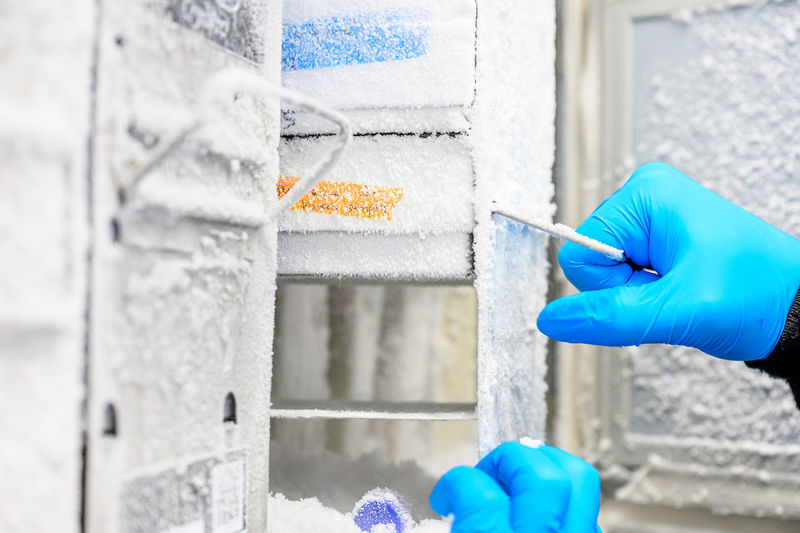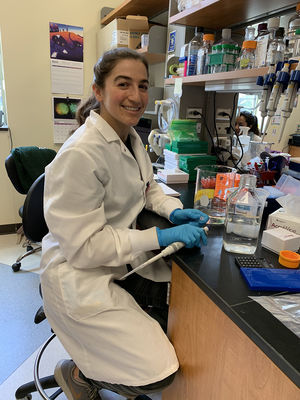 Research labs at Notre Dame have been shut down during the coronavirus crisis. Photo by Matt Cashore ’94
Research labs at Notre Dame have been shut down during the coronavirus crisis. Photo by Matt Cashore ’94
Patricia Clark walked out of her laboratory in Stepan Chemistry Hall the week of March 23 and doesn’t know when she’ll be back.
“We’re fully hibernated as of (March 24),” said Clark, the Rev. John Cardinal O’Hara CSC professor of biochemistry, who studies protein biophysics in living cells. “I’m transitioning to working at home as much as possible.”

In an unprecedented move prompted by the coronavirus pandemic, Notre Dame has suspended laboratory research operations across campus.
The only exception is for coronavirus-related research. The move is intended to protect faculty and staff. “For safety, we want to have as few people here as possible,” said Robert Bernhard, vice president for research.
“It’s disruptive, but it’s completely the right move to make,” Clark said. “We all knew it was coming.” Her lab includes two permanent staff members and four graduate students. Four undergraduates also worked there part-time until in-person classes were suspended and most students went home.
Before locking the lab door, Clark and her staff moved their research samples into a special freezer that keeps them safe at minus-80 degrees Celsius. The shutdown is an inconvenience, but won’t destroy the research. “There’s nothing we’re going to lose permanently,” Clark said.
- Academics, Disrupted
- Change of Course
- Research in Hibernation
Campus laboratories were placed in a “hibernation” state, with instruments and machines shut down or placed in standby mode. Only a small number of approved essential workers have access to maintain equipment and specimens, and to care for lab animals during the shutdown. During the process, Notre Dame is collecting available personal protective equipment, such as laboratory masks and gloves to donate for distribution to health care providers.
Notre Dame joins many major research universities that have announced shutdowns or significant reductions in campus laboratory research because of the pandemic, including Harvard, the Massachusetts Institute of Technology, Duke, Stanford, Rice and others.
Notre Dame’s hibernation involves more than 300 laboratories across campus, most in science and engineering. The University has instituted a staff hiring freeze but announced that it will continue to provide pay and benefits to all full-time and benefits-eligible part-time regular employees.
Notre Dame’s Innovation Park, including the shared wet and dry labs, is accessible only to building tenants during the hibernation. The Hesburgh Libraries and Kresge Law Library also are closed, although online service will continue.
SCALING DOWN

“It’s been a bit hectic,” said Donny Hanjaya-Putra ’07, an assistant professor of aerospace and mechanical engineering. His research focuses on stem cells and molecular therapies. His lab, which includes one graduate student and two postdoctoral researchers, has been scaling down throughout the week of March 23.
He understands the need for the hibernation, but worries about how it will impact the careers of those in his lab. “The most precious resource we have is time. For grad students and postdocs, time is critical for them,” Hanjaya-Putra said. For some students, the shutdown may mean a delay in their course work and postponement of graduation.
Once the lab is allowed to reopen, it likely will take weeks to ready samples to resume the research, Hanjaya-Putra said. A study his team planned in collaboration with researchers at Indiana University School of Medicine in Indianapolis probably won’t happen now, he said.
IMPACT ON STUDENTS

When Matt Sis walked out of the biomaterials laboratory in McCourtney Hall on March 24, he took a box of items from his desk. “Walking out of the building, it was a little surreal,” said Sis, a third-year Ph.D. student in chemical and biomolecular engineering. His work involves synthesizing chemical compounds to create new materials to solve problems in health care.
“The uncertainty has been the hardest thing to deal with — how this will impact my career and will it delay my graduation. I’m trying to take it one day at a time,” he said. “Without access to the labs, I can’t do the core aspects of my work."
During the lab hibernation, professors, postdoctoral researchers and students are being encouraged to find ways to be productive remotely with activities such as computational and simulation work, data analysis, and paper and proposal writing.
“The suspension of research laboratory operations will impact the career and professional development of many faculty, post docs and graduate students very directly and disproportionately,” Bernhard wrote in a letter to the campus community.
A task force representing the Provost’s Office, Notre Dame Research, associate deans and faculty is meeting to discuss the impact and propose responses to help ease the effects of the lab hibernation.

Samantha Golomb, a Ph.D. student in biological sciences, was still working on March 25 in her Harper Cancer Research Institute lab, where she studies how the gut microbiome influences cancer metastases in the brain. “There are still a few people here who are finishing up stuff,” she said. After March 27, only the lab’s principal faculty investigator and a designated staff person would be permitted to enter.
“I won’t be in the lab for the foreseeable future,” Golomb said.
The lab shutdown “will delay my progress by a few months,” Golomb said. “We’re just putting things on pause.” She’s not panicking about the shutdown, noting that other graduate students and labs around the globe also will have to suspend work because of the coronavirus crisis. She plans to focus on writing grant proposals and manuscripts. “I’ll still be able to progress in my research, just not in my benchwork.”
Karla Gonzalez Serrano is a sixth-year Ph.D. student in electrical engineering. Her daily work usually takes place in the Notre Dame Nanofabrication Facility — the cleanroom — and other now-closed labs on campus. She’s back at her family’s home in Monterrey, Mexico.
“I can pick up where I left off,” she said. “I’m at the stage of processing and analyzing data I already acquired.” She’ll be working on papers and manuscripts in the coming weeks. “For me, it’s OK. It’s part of the process to do some work from home.”
Matthew Hanson is a third-year Ph.D. student in computational and theoretical chemistry. “For my work, I only require an internet connection,” he said. He stopped by Nieuwland Science Hall briefly the week of the shutdown to pick up his books and laboratory notes, and is now working from his South Bend home.
Meetings with his academic advisor and lab colleagues are limited to online video conferencing. “I think the biggest worry for (grad students),” he said of the hibernation, “is whether it’s going to delay their graduations.”
Hanson also is a teaching assistant. He team-teaches an undergraduate chemistry lab course. With the shutdown of in-person classes, that course has switched to online video lectures. “We had to make the online lectures more theoretical,” he said, because the students can’t do the lab experiments at home. He’s never previously taught an online course.
While the hibernation will cause delays for some research, the coronavirus crisis likely will point to future expanded research paths for academics, Bernhard said. “There will be infectious disease research opportunities,” he said.
Some research insights may come from the hibernation experience, said Clark, the biochemistry professor and researcher. “There’s an opportunity to step away from the bench and experiments, and really think deeply about what we’re doing and why. And maybe come up with some new ideas.”
Margaret Fosmoe is an associate editor of this magazine.